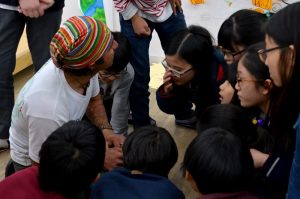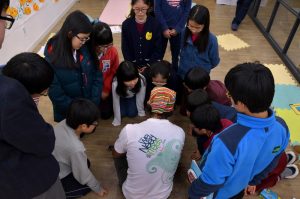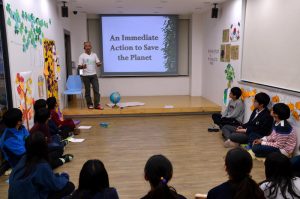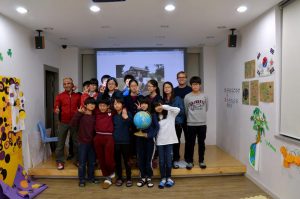 I met Katie in Chuncheon in my first visit in that city.
I met Katie in Chuncheon in my first visit in that city.
I knew her for a while in FB and here I had a chance to meet her in person and she organized me to come over again and talk to her students about my project.
BAsically if I am goig to write about visiting school, I would write the same thing as I do always which is quite boring and here I just copied an email from Katie. I will alsoo add some of the feedbacks from students to this journal when I have them.
To see my students genuinely interested in a topic is no small gift. To see them genuinely interested in a topic and want to talk about it is transforming. Mohammad’s visit was special, not just because his story is interesting and inspiring, but because he engages students, and then encourages them to think about important issues facing our planet today.
He brings the world into the classroom, making it small enough for students to hold in their hands and analyze from different angles. Korean students are typically pretty shy, so I was really surprised  when I saw how many hands shot up to ask questions during his visit. One of the most interesting questions was, “What do you do when you don’t want to keep going?” Another one was, “Don’t your parents want you to stay home?” A few of them laughed when Mohammad replied to the first question, “I try to just keep going, even when I don’t feel like it.”
when I saw how many hands shot up to ask questions during his visit. One of the most interesting questions was, “What do you do when you don’t want to keep going?” Another one was, “Don’t your parents want you to stay home?” A few of them laughed when Mohammad replied to the first question, “I try to just keep going, even when I don’t feel like it.”
Most of my students already understand perseverance–they study even when they don’t feel like it, for hours and hours on end–but I think Mohammad’s visit really opened their eyes to perseverance with a higher purpose. I’m incredibly happy to have them thinking about not just what they are doing, but also why they are doing. Why is not a question that is asked enough in my classroom, and it is a skill I’m constantly trying to help my students hone. To the second question, he very simply said, “At first my mother couldn’t understand what I was doing, or why. But she didn’t have a choice.
This was something I had to do. Now, I think she tries to understand.” All of my students can relate to being scared of doing something that isn’t normal, or that their parents might not like. In fact, most of them go about their day doing exactly as they are  told. Again, there is no questioning of the system. Mohammad’s visit gave them the opportunity not only to see life outside an implied system, but also to see how important it is to ask questions and to try to understand the systems–environmental, political, social, familial–in which we live. Action without empathy or understanding can sometimes be an empty cause. His most poignant lesson was that it is our choice to love or to not love, and that it is up to us as individuals to treat one another with respect and understanding.
told. Again, there is no questioning of the system. Mohammad’s visit gave them the opportunity not only to see life outside an implied system, but also to see how important it is to ask questions and to try to understand the systems–environmental, political, social, familial–in which we live. Action without empathy or understanding can sometimes be an empty cause. His most poignant lesson was that it is our choice to love or to not love, and that it is up to us as individuals to treat one another with respect and understanding.
As one of my students summed it up so eloquently in class today: Mohammad taught me that it is important to try and understand each other and the environment. In order to be a good global citizen it is not just important we give respect. We should also ask each other questions and be able to share our opinions. ********************************************* My older students are currently writing an essay, “How to be good global citizens?” Part of their assignment is to talk about your visit. They will be finished on Tuesday of next week and I’ll forward those on to you.

29 November 2013
Up to 7 December 2025
Current location : Mashhad – Iran
KMs cycled : 107013 km
Days on the road : 4377
Countries I have traveled : 63
School visited : 312
Workshops in schools : 736
Trees planted : 3931
Next destination : Not planned yet …..
Longest distance in one day : 321.8 km
Next Event : Still is not organized.
30 November 2025
I finally left Colombia after 3 months. It was an amazing experience and I enjoyed it a lot. Normally every year I go back Iran to visit my mom but last year I was not able to do so. At the moment I am in Istanbul airport waiting for my connection flight to take me to Tehran. I will stay there 2-3 days before I go to Mashhad to visit my mom.